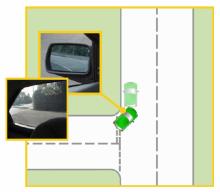Someone found the blog based on this search term and “how to do it”.
Reversing around a corner can be quite easy, but for a lot of people – to start with, anyway – their brains are hardwired to have a problem with which way to steer. Somehow, the brain decides everything is in reverse when you go backwards. It may be to do with the fact that the front of the car swings right when you steer left, and vice versa, or it might be deeper than that. It’s different for everyone.

Reverse Round Corner Graphic
One demonstration I do is to move the car forward using my dual-clutch and ask the pupil to steer towards the kerb. They steer left. Then I quickly move into reverse and ask them to steer towards the kerb again – and a lot of them automatically steer right, hesitate, twitch right and then left, and so on. Even a slight hesitation is enough to point to where the problem might be. I reckon 80% or more of my pupils initially react this way.
If you get them to look out of the back window and then steer towards the kerb, the vast majority can do it correctly… instantly (though you get the occasional one whose brain still tries to compensate and can get it wrong – I have one at the moment, who is dyspraxic).
I sometimes demonstrate driving around a corner forwards and keeping something lined up with the kerb as they steer (the wiper blade edge, the tax disc, or whatever). Then I demonstrate going backwards, using the mirror as if it was the windscreen to steer around and keep the kerb in a fixed position.
Obviously, they need to practice – and they need to stop frequently to think about what to do. If they drop into autopilot, the brain takes over and does it wrong again. Of course, you have to get correct observations in at some point, but that’s easier once they can steer.
Everyone is different, and the fun of the job is finding a method that works. And the satisfaction comes from seeing them gradually develop a natural procedure for something they simply couldn’t do when they first tried it.